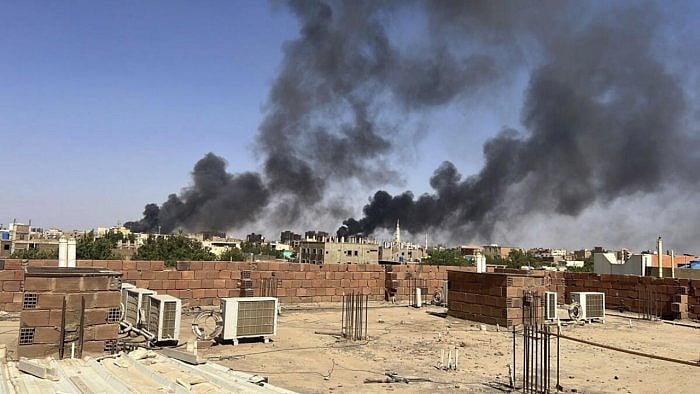
A power struggle between forces loyal to Sudan’s de facto ruler and army chief Abdel-Fattah Burhan and those loyal to his deputy, Mohammed Hamdan Dagalo, who commands the paramilitary Rapid Support Forces (RSF), has plunged the country into bloody violence. Fighting is raging in the capital, Khartoum. Over the past week, the once-bustling city of 5.5 million people has suffered “unspeakable destruction.” Devastated by air strikes, it is now witnessing urban combat with soldiers locked in street-fighting. UN agencies say that at least 427 people have been killed and over 3,700 wounded so far. Since a military coup in 2021, Sudan has been ruled by the Generals and while the latter joined hands to oust a civilian government, they are now at loggerheads over a plan to integrate the RSF into the army. Top generals differ on who should lead the new force. However, this is not just a local struggle for power. Foreign governments, paramilitary forces and mercenaries are the puppet masters. The RSF, whose roots can be traced back to the Janjaweed militia that was responsible for atrocities in the Darfur civil war, is an ally of the UAE in Yemen. The Sudan military is reportedly backed by Egypt. Foreign governments have been generous with expressions of support for democracy, peace and stability in Sudan. But these are at best just words.
A 72-hour ceasefire has been in place since midnight on April 24. This should provide some respite to the Sudanese people and foreigners living in the capital, who have been trapped without food and water for weeks and are looking to escape the violence. Whether the ceasefire will hold – three ceasefire deals in recent days collapsed quickly – is an open question. The UN must step in to extend and enforce a truce. Most UN personnel are reported to have left Khartoum, but it must find ways to utilise the space opened up by the ceasefire to rush food and medicines to the beleaguered people.
The Indian government has done well to initiate Operation Kaveri to evacuate some 2,800 Indian nationals who are in Sudan. Some 108 of them belong to Karnataka’s Hakki Pikki tribal community. They, along with tens of thousands of other nationals, are desperate to leave the war-torn country. A speedy evacuation is the need of the hour. It is a pity that the issue has caused a needless war of words among politicians back home. Former Karnataka Chief Minister Siddaramaiah’s tweet calling on the government to rescue the stranded Hakki Pikki tribals evoked a veritable tongue-lashing from External Affairs Minister S Jaishankar. His rather churlish response was perhaps aimed at point-scoring amid elections in Karnataka.
